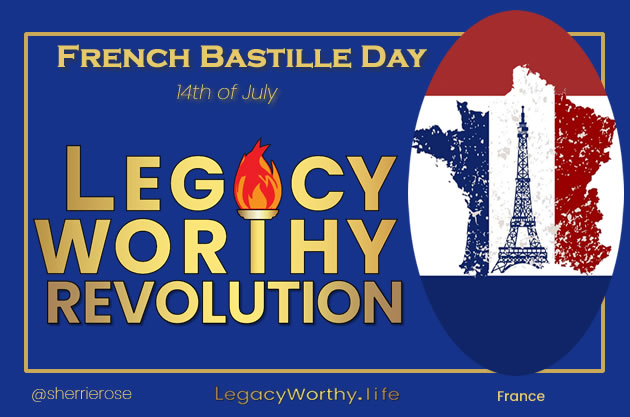Legacy Worthy Revolution: Bastille Day – July 14th

Legacy Worthy Revolution: Bastille Day – July 14th – French National Day
Bastille Day celebrates the start of the French Revolution and a major French holiday. Every year on July 14th, people in France and around the world remember the storming of the Bastille prison, which marked a turning point in history.
Bastille Day carries a special significance for those who are familiar with its historical roots. But even if you’re not particularly knowledgeable about French history or politics, it’s easy to appreciate this day and all it has to offer. Whether you’re looking for a unique way to celebrate your own heritage or want to learn more about another culture, Bastille Day provides plenty of opportunities to do so.
The Bastille was a fortress and prison located in Paris, France. It was originally constructed in the 14th century as a defensive structure to protect the eastern entrance of the city. Over time, it was repurposed as a state prison and became a symbol of royal authority and oppression.
The Bastille was known for its harsh conditions and was often used to detain political prisoners, including individuals who were critical of the monarchy or involved in revolutionary activities. It became a potent symbol of the abuses of the monarchy and the ruling class.
On July 14, 1789, during the French Revolution, a large crowd of revolutionaries stormed the Bastille, seeking to obtain weapons and free the prisoners held there. The storming of the Bastille marked a significant turning point in the revolution and is celebrated as a symbol of the power of the people against tyranny and the beginning of the French Revolution.
Bastille Day is filled with festivities, food, and fun for all to enjoy. From fireworks displays to military parades, Bastille Day is certainly an event worth learning about and experiencing.
Legacy Worthy Revolution Pivotal Event
Symbol of Popular Revolution: The storming of the Bastille was a pivotal event that symbolized the power of the people rising up against oppressive authority. It’s legacy worthy as it exemplifies the spirit of popular revolution and serves as an enduring inspiration for future struggles for freedom and democracy.
Overthrow of Monarchical Tyranny: The storming of the Bastille marked a decisive step towards the overthrow of monarchical tyranny in France. It’s legacy worthy because it demonstrated that the people could challenge and dismantle entrenched power structures, leading to the eventual downfall of the monarchy and the establishment of a new political order.
Catalyst for the French Revolution: The storming of the Bastille was a catalyst for the French Revolution, igniting a series of events that transformed the social, political, and economic landscape of France. It’s legacy worthy as it triggered a period of profound change and shaped the course of modern history.
Demand for Equality and Liberty: The storming of the Bastille was driven by a demand for equality and liberty, with the revolutionaries seeking to dismantle the privileges enjoyed by the aristocracy and establish a more egalitarian society. It’s legacy worthy because it represents a powerful call for social justice and the pursuit of fundamental human rights.
Birth of the Modern Nation-State: The storming of the Bastille played a crucial role in the birth of the modern nation-state in France. It’s legacy worthy as it contributed to the transformation of France from a feudal society to a centralized nation, laying the foundations for modern governance and the principles of citizenship.
Popular Mobilization: The storming of the Bastille showcased the power of popular mobilization and collective action. It’s legacy worthy because it demonstrated the capacity of ordinary individuals to organize and challenge authority, leaving a lasting legacy of grassroots activism and citizen participation in political processes.
Destruction of a Symbol of Oppression: The storming of the Bastille resulted in the destruction of a symbol of oppression and authoritarian rule. It’s legacy worthy as it represented a powerful act of defiance against the abuses of power and stands as a reminder of the importance of holding those in authority accountable to the people they govern.
Inspiration for Revolutionary Movements: The storming of the Bastille had a profound impact beyond the borders of France, inspiring revolutionary movements across Europe and beyond. It’s legacy worthy because it served as a rallying cry for oppressed peoples seeking to challenge oppressive regimes and fight for their rights and freedoms.
Transformation of Political Consciousness: The storming of the Bastille transformed the political consciousness of the French people, awakening a sense of civic duty and the belief in the power of collective action. It’s legacy worthy as it fostered a spirit of political engagement and paved the way for the development of democratic institutions.
Enduring Symbol of Freedom: The storming of the Bastille remains an enduring symbol of freedom and resistance against tyranny. It’s legacy worthy because it continues to inspire individuals and movements striving for a more just and equitable society, reminding us of the ongoing struggle for liberty and the power of ordinary people to effect change.
Historical Significance and Bastille Day National Celebrations
Bastille Day is an important day in French history. It marks the storming of the Bastille prison on July 14th, 1789, which signified the start of the French Revolution. The fall of the Bastille was a symbol of freedom and represented a new era in France’s history.
At the time, France was ruled by an absolute monarchy and its people were subject to many oppressive laws. This was especially true for those living in Paris, where much of the revolution took place. On July 14th, 1789, a large group of revolutionaries stormed the Bastille prison in search of gunpowder and weapons that were believed to be stored there. This act became a symbol of revolt against tyranny and oppression across Europe and beyond.
The storming of the Bastille marked a turning point in French history and set France on a path towards democracy and freedom from oppressive regimes. It has since come to be celebrated as an iconic moment in French culture, with fireworks, parades and other festivities held every year on July 14th to commemorate this event.
The celebration of Bastille Day is observed annually throughout France, as citizens commemorate the storming of the Bastille.This event, which took place on July 14, 1789, was a pivotal moment in France’s history and is now celebrated with great enthusiasm. National festivities across the country include military parades, street parties, fireworks displays and other events.
In Paris, thousands flock to the iconic Champs-Élysées each year for a grand military parade featuring soldiers from all branches of the armed forces. The parade ends with a flypast by the Patrouille de France aerobatics team over Place de la Concorde. Elsewhere in Paris, there are public concerts and firework displays at locations such as Tour Eiffel and Trocadéro.
On this day, many towns and villages hold their own local celebrations. Celebrations often include traditional performances by folk dance groups and live music. In some areas food stalls selling local delicacies enhance the atmosphere of revelry while others host re-enactments of important historical events. As a result of these activities, Bastille Day is an occasion filled with fun, joy and patriotism that unites people all over France in celebrating this important national holiday.
The Storming Of The Bastille
The Storming of the Bastille on July 14th 1789 is a seminal event in French history and marks the beginning of the French Revolution. It was a symbol of the oppressive monarchy that had kept France under its thumb for centuries, and it’s fall represented a new era of freedom and democracy.
The Bastille was originally constructed as a fortress and prison in 1370 by Charles V. For hundreds of years, it was used to detain political prisoners without trial or due process. By the time of the storming, it held only seven inmates, but still served as a potent symbol for abuse of power by the French Monarchy.
On July 14th, an angry mob numbering several hundred stormed the fortress. Though there were only eighty-two guards present, they were unable to repel the onslaught and surrendered after just two hours of fighting. The mob destroyed much of the structure and removed weapons from its armory for use against royal troops elsewhere in Paris.
The event became a major rallying point for revolutionaries across France who sought to overthrow their oppressive government and usher in an era of democracy and liberty. It is remembered each year with parades and fireworks to commemorate this historic moment in French history.
Bastille Day Military Parades
On Bastille Day, the French celebrate their national holiday with military parades throughout the country. The most famous parade is held in Paris, on the Champs-Elysées. It’s a grand and impressive spectacle, featuring soldiers marching in their dress uniforms and carrying flags, as well as tanks and other military vehicles. Many of these vehicles are decorated with flowers to honor fallen soldiers.
The parade is also a chance for the French President to review his troops. Before the parade begins, he takes a tour of the troops that are lined up in formation along the Avenue des Champs-Elysees. Afterward, he reviews them from atop an open topped car, which passes slowly down the avenue accompanied by a band playing military music.
The parade ends with a flyover of jets and helicopters from all branches of the French military. It’s a thrilling sight that serves to remind onlookers of France’s proud history and its commitment to protecting its citizens. As it comes to an end, people cheer loudly and wave flags in celebration of France’s national holiday.
La Marseillaise was written in 1792 and declared the French national anthem in 1795. It is sung throughout the Bastille Day parade and all day.
Bastille Day Fireworks Displays
Bastille Day is a festive occasion for the French, as many people attend fireworks displays to celebrate the day. Many cities across France host fireworks displays on July 14th, from small towns to Paris itself. For example, in Paris, people flock to the Eiffel Tower to watch a stunning display of lights and colors dance in the sky.
The history of Bastille Day fireworks dates back to 1880 when it was first celebrated in Grenoble. Since then, more cities have joined in the festivities and now there are countless displays throughout the country. Each one is unique, with its own mesmerizing show of sparkles and explosions reflecting off the night sky. People gather together at these events to marvel at the beauty and get lost in the moment.
Fireworks have become an iconic symbol of Bastille Day and every year they bring joy and excitement to those who participate in them or watch them from afar. It’s a great way for everyone to come together and honor this special holiday by enjoying a spectacular show that will be remembered for years to come.
Bastille Day Cultural Events And Traditions
Another important part of Bastille Day is the celebration of French cultural events and traditions. The streets are filled with lively music, food, parades and more. On July 14th, many people in France will gather to watch firework displays as a part of their traditional festivities. In Paris, there are also public readings of the Declaration of the Rights of Man and Citizen, which was adopted on July 14th in 1789 – it symbolizes the end of monarchy rule in France.
Aside from fireworks and parades, there are other activities that celebrate French culture on Bastille Day. Many French towns hold art shows and competitions where participants can showcase the beauty of their local culture through various forms such as painting or dance. There are also numerous contests for children such as a ‘Best Flag’ competition to honor the country’s national flag. Other popular events include theatrical performances by local actors, folk dances, and even pet shows!
In addition to these festivities, many restaurants offer special Bastille Day menus featuring traditional French dishes such as ratatouille or tarte flambée. Restaurants may also offer discounts or free drinks if you wear red-white-and-blue clothing – the colors of the French flag! To really get into the spirit of Bastille Day, some people will even dress up in 18th century costumes to recreate the look and feel of revolutionary Paris at that time. All these activities help to make Bastille Day an enjoyable experience for all who take part in it!
Where To Celebrate In France
If your children are looking to celebrate Bastille Day in true French fashion, there are a variety of places throughout France that offer special activities and events. From Paris to the countryside, there is something for everyone.
In the capital city of Paris, the festivities begin early on July 14th. The day typically starts with a military parade on the Champs-Elysées, which is followed by a fireworks display in the evening. Throughout this day, there are also many concerts, festivals and other cultural events taking place around the city.
For those looking for a more rural experience, many small towns across France host their own local celebrations. These usually include traditional folk music and dancing performances as well as food stalls with delicious French delicacies. In addition to these activities, some towns also have firework displays or reenactments of historical battles from the Revolution period.
Bastille Day International Observances
Bastille Day, or La Fête Nationale (French National Day), is a French holiday celebrated on July 14th each year. It marks the storming of the Bastille on July 14th, 1789, which was a pivotal moment in the French Revolution and led to the overthrow of the monarchy. On this day, people from all over France come together to celebrate their national pride. People typically watch fireworks displays and military parades that honor France’s military and political accomplishments.
Bastille Day is a holiday celebrated in many countries around the world, in addition to France. It typically falls on July 14th, commemorating the storming of the Bastille prison in 1789 during the French Revolution. But how is this special day celebrated outside of France? This article will explore some of the various ways Bastille Day is honored and celebrated all over the globe.
In many countries, Bastille Day is celebrated by hosting large parties with food, drinks, music, and more. In Canada for example, Montrealers gather at Parc LaFontaine for a huge celebration that includes activities for all ages like live bands, DJs, dancers and performers. Some cities in Australia also commemorate this day with fireworks displays and outdoor festivals featuring traditional French music and cuisine.
Bastille Day is primarily celebrated in France to commemorate the storming of the Bastille and the French Revolution. While the province of Quebec in Canada has a significant French-speaking population and strong cultural ties to France, Bastille Day is not officially recognized as a public holiday in Quebec. However, it is not uncommon for French communities in Quebec to organize events and celebrations on or around July 14th to commemorate Bastille Day. These events often include cultural activities, music, fireworks, and gatherings that highlight the shared history and heritage of the French-speaking population in Quebec. It’s worth noting that Quebec has its own unique cultural celebrations, such as Saint-Jean-Baptiste Day on June 24th, which is a public holiday in the province and celebrates Quebec’s patron saint and its distinct cultural identity.
Bastille Day is also marked by parades in many countries such as Uruguay and Cuba. These parades typically feature marching bands playing military-style music accompanied by floats decorated with French colors – blue, white and red – along with banners displaying the tricolor flag of France. For those who are unable to attend these events firsthand, there are usually televised broadcasts of these parades so everyone can experience them from home.
In addition to parties, parades and other festivities to mark Bastille Day around the world, it is also an opportunity for people to learn more about French culture and its history as well as appreciate its contributions to society. People can participate in language classes or visit galleries dedicated to works from renowned French artists like Claude Monet or Pierre-Auguste Renoir. Museums often host exhibitions showcasing important artifacts from France’s past or even present-day life such as fashion trends or culinary delights native to the country. All these activities serve not only as an entertaining way to observe this momentous event but also provide a unique learning experience about French culture and its impact on society today.
In recent years, Bastille Day has become increasingly popular among non-French people as well. Since it is an international holiday, many countries across the world hold celebrations for it as well. These events often include live music performances, traditional French cuisine, re-enactments of historical scenes from the French Revolution, and other festivities. Even though it may not be an official national holiday in some countries outside of France, many citizens still observe it with vigor and enthusiasm.
In each country where Bastille Day is celebrated, its observance serves to remind us all of our shared history and values. By coming together to honor those who fought for freedom during the French Revolution, we can continue to build bridges between cultures and recognize our collective humanity. No matter where you are in the world on July 14th, take some time to commemorate this special day in your own way – whether that’s attending a large parade or simply enjoying a piece of classic French pastry in peace!
Important Symbols of Bastille Day
What Is The Significance Of The French Flag In Bastille Day Celebrations?
The French flag is a powerful symbol throughout the world and often used to represent freedom, unity, and revolution. In Bastille Day celebrations, the flag takes on an even more important significance as it is used to commemorate the storming of the Bastille that marked a crucial moment in the French Revolution.
The use of the French flag in Bastille Day celebrations is an important part of how the holiday is observed. The tricolor of blue, white, and red represents values such as freedom, equality, brotherhood/sisterhood, and also serves as a reminder of those who died during the Revolution. During Bastille Day festivities, many people will wave flags or display them prominently to honor those who fought for France’s independence. There may also be parades or marches where participants carry flags in honor of France’s history and those who gave their lives for its cause.
In addition to honoring those who sacrificed so much to bring about a free nation, displaying the French flag during Bastille Day can be seen as way to celebrate France itself. The holiday marks an incredibly important day in which ordinary citizens showed their courage and bravery by taking on government forces with no military training or experience – something that ultimately changed the course of history. Being able to celebrate this event with such a powerful symbol can help bring together people from all walks of life in a spirit of solidarity and hope for what could be achieved through unity and strength.
French national flag, or tricolor , are important symbols of Bastille Day. The French national flag is one-and-a-half times as wide as it is tall. It consists of three vertical bands of equal width colored blue, white and red. The same colors are displayed in bunting and banners of many shapes on Bastille Day. People may also wear clothing or face paint in these three colors. Today, flying or displaying the French flag during Bastille Day remains one of many ways that people around the world honor this significant moment in history – one that continues to inspire generations both inside and outside of France.
What Is The Origin Of Bastille Day as a National Holiday?
Bastille Day is a holiday that has been celebrated by the French people since 1880. It commemorates the storming of the Bastille prison in Paris on July 14th 1789, which marked the beginning of the French Revolution. But what is the origin of this holiday?
The Bastille was originally a medieval fortress built in 1370 to protect Paris from attack. The fortress became a prison in 1659, and it was used to hold political prisoners who were seen as threats to the government. The prison walls were seven meters thick and there were only eight guards present when the revolutionaries stormed it on July 14th 1789. This event marked the start of a period of bloody conflict between citizens and their government.
The storming of the Bastille was important for two reasons: firstly, it symbolized an uprising against absolute monarchy; secondly, it liberated political prisoners who had been unjustly held captive by their government. This event became known as a major milestone in France’s fight for freedom and democracy, and it inspired many other revolutions around the world.
In time, July 14th came to be seen as a day of liberation in France and over time its importance evolved into an annual celebration of French unity and national pride. To this day Bastille Day is celebrated with parades, fireworks, concerts and military displays throughout France – all commemorating this historic event that changed French history forever.
Unique Customs Associated With Bastille Day
Are there any unique customs associated with Bastille Day? As one of France’s national holidays, it is celebrated in many different ways. From the iconic parades and military displays to the historical reenactments and firework shows, there are many interesting traditions that are observed by both locals and tourists alike. It is an occasion that holds a place of significance for the French people, and has been celebrated since its inception as a public holiday in 1880.
When observing Bastille Day, some of the more well-known customs involve flying the French flag or displaying it prominently in homes or businesses. This symbolizes national pride and unity among citizens of France, regardless of their political differences. Additionally, it serves as a reminder of the country’s victory over tyranny during the storming of the Bastille prison fortress on July 14th 1789.
The day also typically includes concerts, parades, parties, and fireworks shows taking place in major cities throughout France. During these celebrations, people will often wear tricolor cockades – a ribbon decorated with three colors which represent liberty, equality and fraternity – to show their support for their country’s history. Additionally, some areas will even host special events such as military displays or costumed reenactments to commemorate this momentous day in French history.
These festivities are just one way that citizens around France come together to honor this important holiday. In addition to these celebratory activities, many people in France take time out to remember those who have lost their lives fighting for freedom throughout history. Whether through reflection or celebration, Bastille Day continues to be an important part of French culture today.
The celebration of Bastille Day on July 14th is an important event in France, as it marks both the storming of the Bastille prison and the start of the French Revolution. The holiday has been celebrated for centuries and continues to be a major event in French culture today. It’s traditional activities, such as parades and fireworks, have spread to many other countries around the world. The French flag is a symbol of pride and freedom during Bastille Day celebrations, representing not only a nation but also its people. As we commemorate this special day each year, let us remember its importance in our history and take time to appreciate its significance in our lives today.



